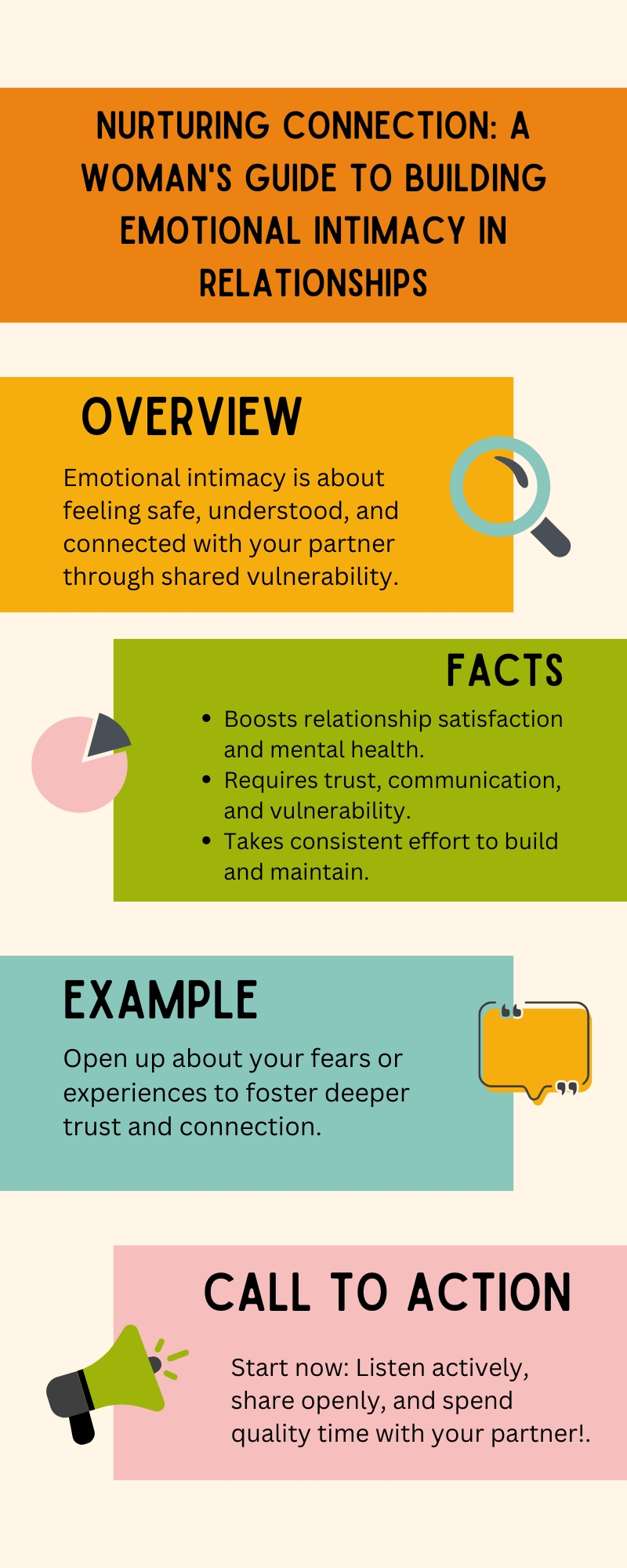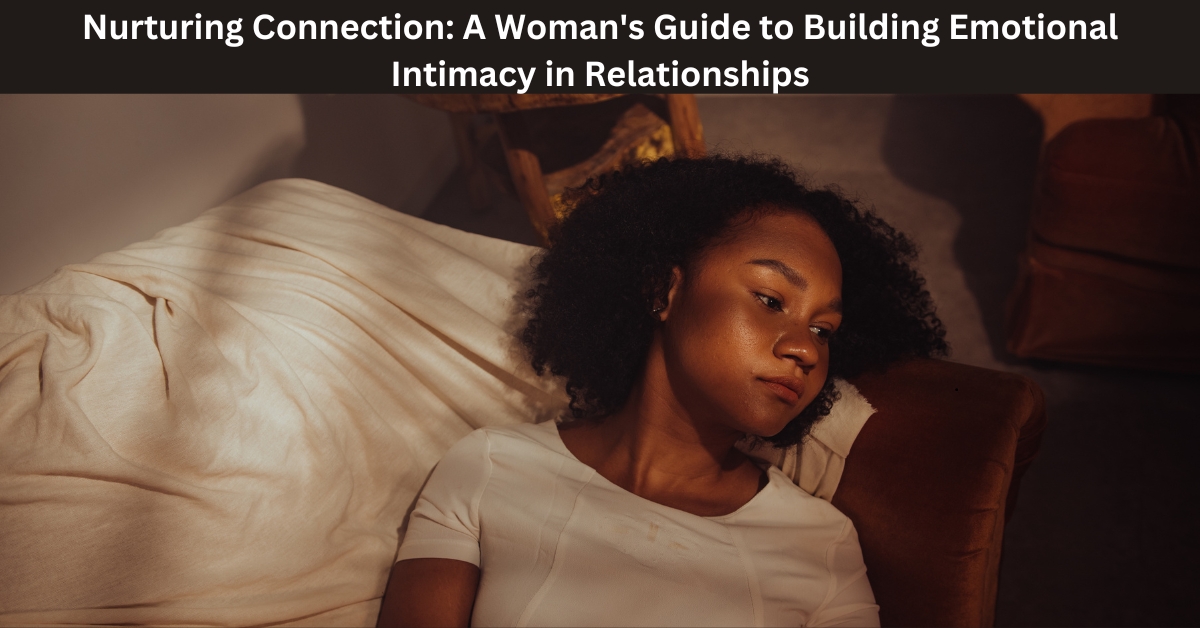Emotional intimacy is the foundation of healthy and fulfilling relationships, particularly for women. It goes beyond physical closeness to include the deep sharing of thoughts, feelings, and vulnerabilities.
This blog article explores the importance of emotional intimacy, the key elements for building it, and practical strategies to overcome common barriers.
By focusing on trust, vulnerability, and effective communication, women can cultivate stronger emotional connections, leading to increased well-being, improved mental health, and greater relationship satisfaction.
The journey to emotional intimacy is ongoing, but with intentional effort, it strengthens the bonds that nourish our hearts and souls.
Key Takeaways:
| Key Element | Description |
|---|---|
| Trust | Build trust through consistent actions, honesty, and care. |
| Vulnerability | Share insecurities, fears, and dreams to create an open, accepting space. |
| Communication | Practice active listening, empathy, and honesty to foster deeper understanding. |
| Quality Time | Spend time together, engage in shared activities, and create lasting memories. |
| Affection | Express love through both physical touch and thoughtful gestures. |
| Boundaries | Respect each other’s personal space and needs to nurture emotional safety. |
| Commitment | Emotional intimacy requires consistent, long-term dedication and effort. |
Understanding Emotional Intimacy
At its core, emotional intimacy is a profound, meaningful connection where both partners feel safe, secure, and able to be their authentic selves. It contrasts with surface-level interactions and involves embracing vulnerability and feeling truly understood.
Emotional intimacy is the bedrock upon which other forms of intimacy are built:
| Type of Intimacy | Description |
|---|---|
| Physical Intimacy | The closeness and touch between bodies. |
| Intellectual Intimacy | Sharing ideas, perspectives, and engaging in meaningful conversations. |
| Spiritual Intimacy | Connecting through shared beliefs, values, and a sense of the divine. |
When relationships lack emotional intimacy, it often becomes the core issue that needs to be addressed. By cultivating this deep, heartfelt connection, couples can develop mutual respect, trust, and a profound understanding of one another.

The Importance of Emotional Intimacy for Women
As women, emotional intimacy holds immense significance for our overall well-being and the quality of our relationships. Here’s why it’s so crucial:
1. Increased Well-Being and Relationship Satisfaction
Emotional intimacy is strongly linked to greater satisfaction and fulfillment in our relationships. When we feel deeply understood, accepted, and able to be vulnerable, it fosters a profound sense of security and belonging.
2. Improved Mental Health
The benefits of emotional intimacy extend far beyond our relationships. Research has shown that it can have a positive impact on our mental health, reducing stress and enhancing our overall sense of well-being.
3. Feeling Valued and Understood
Emotional intimacy allows us to be our authentic selves without fear of judgment or rejection. It creates a safe space where we can share our deepest thoughts, feelings, and experiences, and feel truly seen and appreciated.
4. Increased Sense of Safety and Security
The emotional bond that develops through intimacy provides a profound sense of safety and security within our relationships. This foundation of trust and understanding can be a wellspring of strength, especially during challenging times.
Ultimately, emotional intimacy is essential for women’s overall health and the fulfillment of our relationships. By prioritizing this deep, meaningful connection, we can cultivate the type of bonds that nourish our hearts and souls.

Key Elements of Building Emotional Intimacy
Fostering emotional intimacy is an ongoing journey that requires consistent effort, care, and a willingness to be vulnerable. Let’s explore the key elements that can help you build and nurture this profound connection.
1. Creating a Safe Space
A safe, secure, and judgment-free space is the foundation for emotional intimacy to flourish. Here’s how to create this environment:
- Build Trust: Consistent actions and words that demonstrate reliability, honesty, and care.
- Encourage Vulnerability: Openly sharing your insecurities, fears, and dreams, and creating an atmosphere where your partner feels safe to do the same.
- Practice Self-Disclosure: Opening up about your personal experiences, thoughts, and emotions to foster closeness.
- Support Each Other: Being there for your partner during challenging times, offering compassion and understanding.
2. Effective Communication
Communication is the cornerstone of emotional intimacy. By focusing on active listening, empathy, and honesty, you can deepen your connection:
- Active Listening: Giving your partner your full attention, seeking to understand their perspective, and asking thoughtful questions.
- Empathy: Striving to understand your partner’s emotions and experiences, even if they differ from your own.
- Honesty: Communicating openly and truthfully about your thoughts, feelings, and needs.
- Non-Verbal Cues: Paying attention to body language, eye contact, and tone of voice to enhance your understanding.
3. Sharing Experiences and Activities
Spending quality time together and enjoying shared experiences can significantly contribute to emotional intimacy:
- Shared Laughter: Engaging in playful, lighthearted moments can create a sense of joy and connection.
- Trying New Things: Exploring new hobbies, interests, or activities together can foster a sense of adventure and collaboration.
4. Showing Affection
Expressing affection, both physically and through thoughtful gestures, can make your partner feel valued, secure, and cherished:
- Non-Sexual Affection: Simple acts like holding hands, cuddling, or offering a comforting embrace.
- Thoughtful Gestures: Unexpected acts of kindness, such as leaving a loving note or planning a special date night.
5. Respecting Boundaries
Establishing and respecting each other’s boundaries is crucial for building trust and maintaining a healthy, autonomous relationship.
6. Commitment
Nurturing emotional intimacy requires a steadfast commitment to the process. It’s not a one-time achievement, but an ongoing journey of growth and understanding.

Overcoming Barriers to Emotional Intimacy
While the benefits of emotional intimacy are clear, there can be significant barriers that hinder its development. Let’s explore some of the common challenges and strategies to overcome them.
1. Fear of Vulnerability
One of the most significant obstacles to emotional intimacy is the fear of vulnerability. Sharing our innermost selves can feel risky and uncomfortable, leading to avoidance or withdrawal. This fear may stem from:
- Low Self-Esteem: Doubts about our worthiness of love and acceptance.
- Past Hurts and Lack of Trust: Negative experiences that have made us wary of opening up.
Overcoming this fear requires courage, self-compassion, and a willingness to take small, gradual steps toward vulnerability.
2. Communication Issues
Misunderstandings, a lack of emotional awareness, or negative childhood experiences can all hinder effective communication and emotional intimacy. Some women may find emotions overwhelming and, consequently, avoid or suppress them.
To address these barriers, it’s important to:
- Develop a deeper understanding of your own emotions and how to express them.
- Practice active listening and seek to truly understand your partner’s perspective.
- Address any unresolved conflicts or resentments that may be hindering open communication.
3. Practical Steps to Enhance Emotional Intimacy
Nurturing emotional intimacy is an active process that requires intentionality and consistency. Here are some practical steps you can take:
- Share Personal Stories: Reveal your unique experiences, memories, and perspectives to foster a deeper sense of connection.
- Ask Meaningful Questions: Inquire about your partner’s dreams, goals, worries, and favorite memories to learn more about them.
- Practice Active Listening: Demonstrate your engagement by paraphrasing, asking follow-up questions, and showing genuine interest.
- Express Appreciation: Regularly acknowledge and appreciate the qualities, actions, and efforts of your partner.
- Communicate Feelings Openly: Don’t be afraid to share your emotions, both positive and negative, in a constructive manner.
- Prioritize Quality Time: Unplug from distractions and focus on enjoying each other’s company.
- Be Willing to Have Difficult Conversations: Address any concerns or conflicts in a compassionate, solution-oriented way.
- Embrace Authentic Self-Disclosure: Reveal your true self, including your vulnerabilities, to cultivate a deeper bond.

Rebuilding Emotional Intimacy
Over time, even the strongest emotional connections can wane. If you find yourself in a situation where intimacy has diminished, there are steps you can take to rebuild it:
- Identify and Respect Boundaries: Recognize and honor each other’s personal boundaries to create a safe space for vulnerability.
- Recognize the Needs of Each Partner: Strive to understand and meet each other’s emotional needs, which may have evolved.
- Communicate Openly About Your Concerns: Have an honest dialogue about the changes you’ve noticed and your desire to reconnect.
- Consider Professional Help: If you’re struggling to rebuild intimacy on your own, seek the guidance of a couples therapist or counselor.

Maintaining Emotional Intimacy
Emotional intimacy is not a destination, but an ongoing process that requires consistent effort and care. To maintain this deep connection over time:
- Continue to Prioritize Quality Time: Make regular, uninterrupted time for each other a priority.
- Show Affection Regularly: Express your love and appreciation through both physical and thoughtful gestures.
- Practice Gratitude: Regularly acknowledge and appreciate the qualities and actions that make your partner special.
- Engage in Meaningful Conversations: Continuously learn about each other, share your dreams and fears, and deepen your understanding.
Conclusion
Emotional intimacy is the foundation for fulfilling, long-lasting relationships, and it holds particular significance for women. By understanding its importance, embracing the key elements for building it, and overcoming common barriers, you can nurture the deep, meaningful connections you deserve.
Remember, emotional intimacy is a journey, not a destination. Approach it with patience, compassion, and a willingness to be vulnerable. Invest in your relationship, communicate openly, and cherish the profound sense of safety, trust, and belonging that emotional intimacy can bring. Embark on this journey, and may your connections blossom with greater depth and intimacy.
FAQs
1. What is emotional intimacy, and why is it important in relationships?
Emotional intimacy is the deep connection between partners where both feel safe, understood, and able to express their true selves. It goes beyond physical closeness, fostering trust and mutual understanding. Emotional intimacy is crucial as it strengthens relationships, enhances mental well-being, and creates a sense of security and belonging.
2. How can I build emotional intimacy in my relationship?
Building emotional intimacy requires trust, vulnerability, and open communication. You can start by sharing personal thoughts and feelings, actively listening to your partner, and spending quality time together. Regular expressions of affection and respect for each other’s boundaries also contribute to creating a secure, emotionally rich bond.
3. What are the common barriers to emotional intimacy?
Common barriers include fear of vulnerability, past emotional wounds, and poor communication. These can stem from low self-esteem, unresolved conflicts, or negative experiences. Overcoming these barriers involves taking small, consistent steps towards openness, developing emotional awareness, and fostering a safe environment for both partners.
4. How can I maintain emotional intimacy in a long-term relationship?
Maintaining emotional intimacy involves ongoing effort. Prioritize regular quality time together, express appreciation and affection, and continue to engage in meaningful conversations. Be open to having difficult discussions, respect each other’s needs, and adapt to the evolving dynamics of your relationship.



